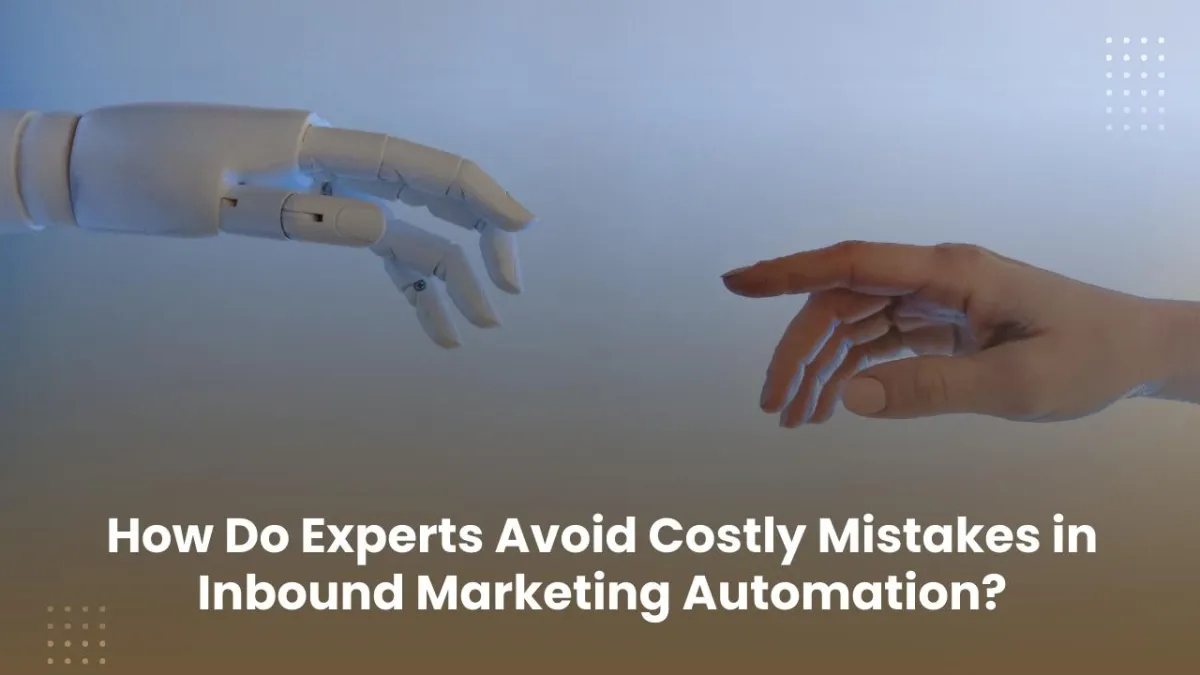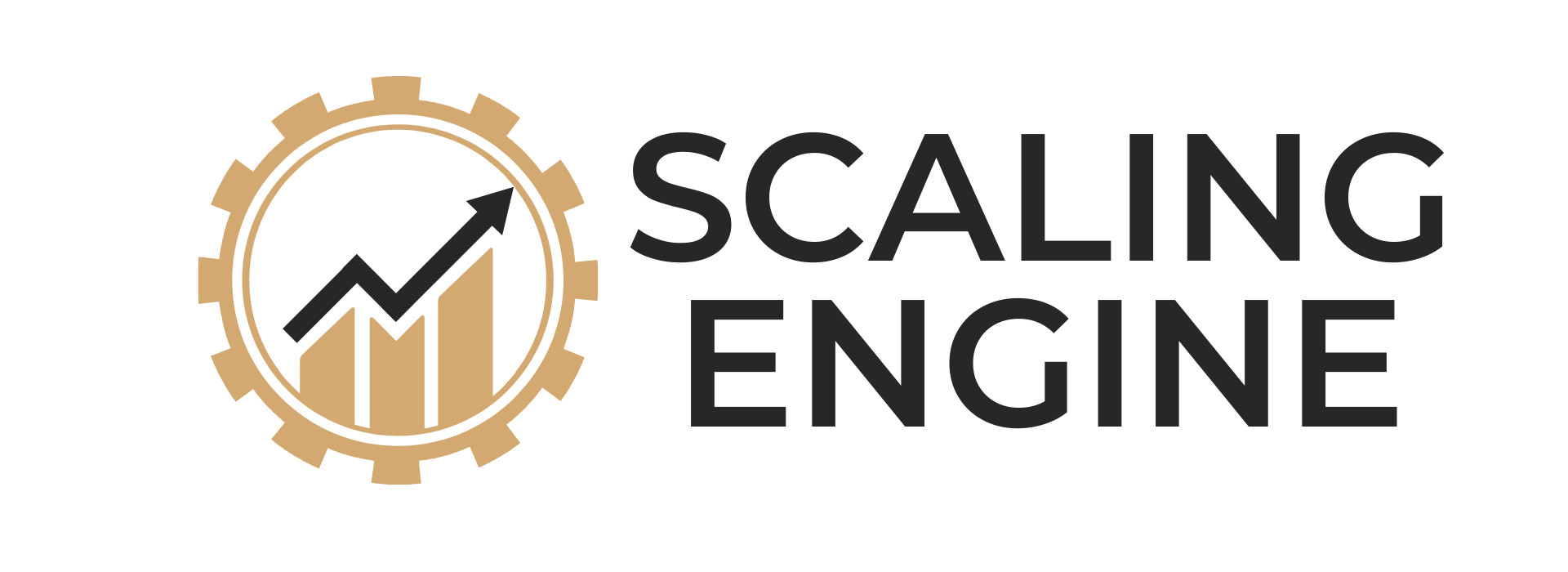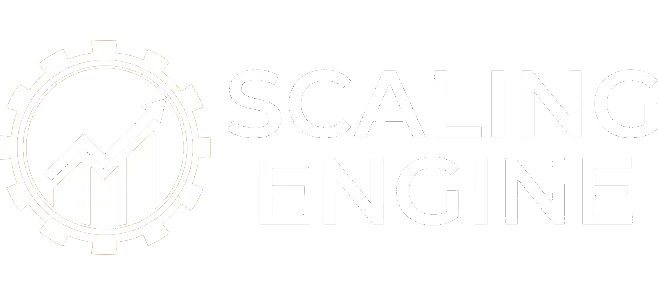
Tips to Avoid Costly Mistakes in Inbound Marketing Automation
How Do Experts Avoid Costly Mistakes in Inbound Marketing Automation?
Inbound marketing automation has transformed how businesses attract, nurture, and convert leads. By automating repetitive tasks and delivering personalized experiences at scale, businesses can improve efficiency and increase revenue. However, despite its potential, many organizations fail to achieve the expected ROI due to common pitfalls.
These mistakes typically arise from poor strategy, lack of personalization, ineffective lead scoring, or failure to track and optimize campaigns. To unlock the full potential of inbound marketing automation, experts follow a structured approach that addresses these challenges, enhancing overall performance and driving sustainable growth.
This article explores common mistakes in inbound marketing automation and provides expert strategies to avoid them, helping businesses ensure their automation efforts lead to consistent results.
The Importance of a Strong Inbound Marketing Automation Strategy
Inbound marketing automation is more than simply automating email campaigns or scheduling social media posts. It plays a critical role in crafting seamless customer journeys, enhancing engagement, and boosting conversion rates. When automation is improperly implemented, it can result in disengaged prospects, wasted resources, and missed opportunities.
A well-structured automation strategy ensures:
Marketing efforts are aligned with business objectives.
Prospects receive relevant and timely communications.
Lead nurturing processes effectively drive conversions.
Marketing teams can focus on high-value tasks instead of manual workflows.
Businesses maximize the return on investment from automation tools.
Common Mistakes in Inbound Marketing Automation and How Experts Avoid Them
1. Implementing Automation Without a Clear Strategy
Many businesses invest in inbound marketing automation without a defined plan. They automate processes without identifying key objectives, which leads to ineffective campaigns and wasted resources.
How Experts Avoid This Mistake:
Clearly define automation goals such as lead generation, customer retention, or sales funnel optimization.
Develop a roadmap for automation workflows that aligns with both marketing and sales objectives.
Draw on successful marketing automation examples from leading companies to understand best practices.
Regularly assess automation performance to ensure alignment with business goals.
2. Over-Automating Customer Interactions
Automation should enhance customer engagement, not replace human interactions. Over-automating interactions risks making communication impersonal and robotic, which can erode customer trust.
How Experts Avoid This Mistake:
Strike a balance between automation and human interaction to preserve a personalized experience.
Leverage segmentation and behavioral triggers to tailor content based on the unique needs of each customer.
Implement AI-driven personalization to make automated messages feel more human.
Continuously test and refine automated responses to ensure they align with customer expectations.
3. Poor Lead Scoring and Qualification
Ineffective lead scoring can lead to wasted time and resources. Many businesses either pass unqualified leads to sales teams or neglect high-potential prospects due to inadequate lead qualification models.
How Experts Avoid This Mistake:
Develop a lead scoring system that assigns points based on customer engagement, behavior, and demographics.
Collaborate with sales teams to define criteria for marketing-qualified leads (MQLs) and sales-qualified leads (SQLs).
Continuously review and adjust lead scoring models based on actual conversion data.
Use automation to segment leads and prioritize high-intent prospects.
4. Failing to Maintain Data Hygiene
Automation tools rely heavily on clean and accurate data. However, many businesses overlook the importance of data hygiene, leading to issues like duplicate contacts, outdated information, and incorrect segmentation.
How Experts Avoid This Mistake:
Implement data validation and cleansing processes to remove duplicates and outdated records.
Ensure seamless integration between inbound marketing automation platforms and CRM systems.
Use data enrichment tools to enhance customer profiles with up-to-date and relevant insights.
Regularly audit databases to ensure the quality of lead information.
5. Ignoring Performance Metrics and Optimization
Setting up automation workflows without tracking key performance metrics leads to missed opportunities for improvement. Without the right data, businesses can’t identify which elements of their automation strategy are working or need refinement.
How Experts Avoid This Mistake:
Track performance indicators like open rates, click-through rates, conversion rates, and ROI.
Use A/B testing to optimize automated emails, landing pages, and lead nurturing sequences.
Analyze customer behavior to refine workflows and messaging.
Adjust automation strategies based on real-time data insights and feedback.
6. Using a One-Size-Fits-All Approach
Not all prospects are the same, and sending generic messages to an entire contact list can lead to lower engagement. Personalization is key to effective inbound marketing automation.
How Experts Avoid This Mistake:
Segment leads based on their interests, behaviors, demographics, and past interactions.
Use dynamic content to personalize emails, landing pages, and chatbot responses.
Implement behavior-based automation triggers to send relevant content at the optimal time.
Test different messaging approaches to see which resonates best with various audience segments.
7. Relying Solely on Email Automation
Email automation is a powerful tool, but limiting automation to just email campaigns diminishes the overall effectiveness of marketing strategies. Multi-channel approaches tend to generate better results.
How Experts Avoid This Mistake:
Embrace multi-channel automation strategies that include SMS, social media, chatbots, and retargeting ads.
Integrate automation with customer support systems to provide seamless assistance across platforms.
Utilize predictive analytics to anticipate customer needs and automate responses accordingly.
Ensure a consistent brand experience across all automated touchpoints.
Best Practices to Maximize the Success of Marketing Automation
1. Align Automation Workflows with the Customer Journey
Mapping out each stage of the customer journey is vital for identifying where automation can enhance engagement. By leveraging automation strategically, businesses can guide prospects through the sales funnel with personalized, relevant content.
How Experts Avoid This Mistake:
Automate content delivery based on customer journey stages (e.g., awareness, consideration, decision).
Implement behavioral triggers to automate follow-ups at the right moment to keep prospects moving through the funnel.
Use analytics to refine workflows based on real-time customer behavior.
2. Leverage AI and Machine Learning for Smarter Automation
AI-driven tools help businesses analyze customer behavior and predict future actions, enabling automation systems to become more intelligent and responsive.
How Experts Avoid This Mistake:
Use AI-driven tools to analyze customer behavior and predict future actions to automate personalized interactions.
Implement AI-powered chatbots that provide real-time support based on user queries.
Utilize machine learning to improve content recommendations, driving a more tailored experience for each customer.
3. Collaborate with Sales Teams for Seamless Lead Handover
Marketing automation should work hand-in-hand with the sales process. Without integration, leads generated through automation may not be effectively nurtured or converted by sales teams.
How Experts Avoid This Mistake:
Define clear criteria for marketing-qualified leads (MQLs) and sales-qualified leads (SQLs), ensuring seamless handover from marketing to sales.
Use automation to send notifications to sales teams when a lead reaches a high-intent stage.
Automate scheduling and follow-up sequences to keep leads engaged throughout the decision-making process.
4. Invest in Regular Training and Optimization
Regularly training marketing teams on the latest automation tools and techniques ensures that everyone stays up-to-date on best practices, which enhances overall effectiveness.
How Experts Avoid This Mistake:
Conduct ongoing training for marketing teams on the latest trends in automation and best practices.
Regularly audit automation workflows to identify areas that need improvement and optimization.
Work with agencies or consultants to refine automation strategies and execution.
The Role of Marketing Automation Agencies in Avoiding Costly Mistakes
Many businesses choose to partner with marketing automation agencies to optimize their automation strategies and avoid common pitfalls. These agencies provide a range of services to improve automation efficiency:
Expertise in selecting the right automation tools that fit business needs.
Advanced data analysis to enhance targeting and segmentation.
Optimization of automation workflows to boost engagement and conversions.
Hands-on support for troubleshooting and refining automation campaigns.
By leveraging the expertise of an agency, businesses can significantly enhance their marketing automation ROI and sidestep costly mistakes.
Enhancing Customer Retention with Marketing Automation
Customer retention is a vital aspect of sustainable business growth. While acquiring new customers is crucial, retaining existing ones often proves more cost-effective and impactful on long-term revenue. Unfortunately, many businesses focus primarily on lead generation and sales, neglecting the post-purchase experience. A well-structured retention strategy, however, can ensure long-lasting customer relationships.
Marketing automation plays a key role in driving customer retention through personalized, timely engagement that increases satisfaction, reduces churn, and fosters repeat sales.
How Experts Avoid This Mistake:
Automate personalized follow-up emails, thanking customers for purchases, sharing tutorials, or offering exclusive discounts.
Use behavioral tracking to identify disengaged customers and trigger re-engagement campaigns with incentives.
Implement automated loyalty programs to reward repeat customers and encourage retention.
Avoiding Spam-Like Messaging in Automation
Sending irrelevant or excessive messages can lead to an influx of unsubscribes, reduced engagement, and potential damage to the sender reputation. Customers appreciate receiving content that provides value, rather than spammy, repetitive messages.
How Experts Avoid This Mistake:
Set frequency caps on automated emails to avoid overwhelming subscribers.
Personalize messages based on user behavior to make communications relevant.
Allow customers to set their own communication preferences, reducing the likelihood of them unsubscribing.
Use A/B testing and monitoring to fine-tune email frequency, subject lines, and engagement strategies.
Integrating Marketing Automation with Sales Teams
Effective integration between marketing and sales teams is crucial for seamless lead conversion. Without a smooth handoff, leads generated by marketing automation may not be properly nurtured or converted.
How Experts Avoid This Mistake:
Set up automated lead handover processes with clear MQL and SQL definitions.
Provide sales teams with actionable insights on lead interactions with emails, content, and website visits.
Integrate appointment scheduling and follow-up tasks into the automation process to ensure leads stay engaged.
Final Thoughts: Building a Profitable Inbound Marketing Automation Strategy
Inbound marketing automation is a game-changing tool for businesses seeking to drive efficiency, engagement, and revenue growth. However, to realize its full potential, companies must approach automation strategically, avoiding common pitfalls and focusing on measurable results.
By defining clear goals, maintaining data accuracy, optimizing performance metrics, and leveraging advanced technologies like AI, businesses can unlock significant ROI from their automation efforts.
FAQs
What is inbound marketing automation?
Inbound marketing automation uses software to streamline and personalize marketing efforts, helping businesses attract, nurture, and convert leads efficiently through automated workflows, email campaigns, and data-driven insights.
How does marketing automation improve ROI?
Marketing automation improves ROI by reducing manual tasks, increasing efficiency, enhancing lead nurturing, and delivering personalized experiences, resulting in higher conversion rates, customer retention, and revenue growth.
What are common mistakes in inbound marketing automation?
Common mistakes include over-automation, poor lead scoring, lack of personalization, ignoring data hygiene, and failing to analyze performance metrics for optimization and continuous improvement.
How can businesses personalize automated marketing?
Businesses can personalize automation by using segmentation, behavioral triggers, dynamic content, AI-driven recommendations, and customer journey mapping to deliver relevant, engaging, and timely messages to the right audience.
Should small businesses invest in marketing automation?
Yes, marketing automation helps small businesses scale efficiently by automating repetitive tasks, improving customer engagement, optimizing lead nurturing, and increasing overall marketing effectiveness without requiring extensive resources.


